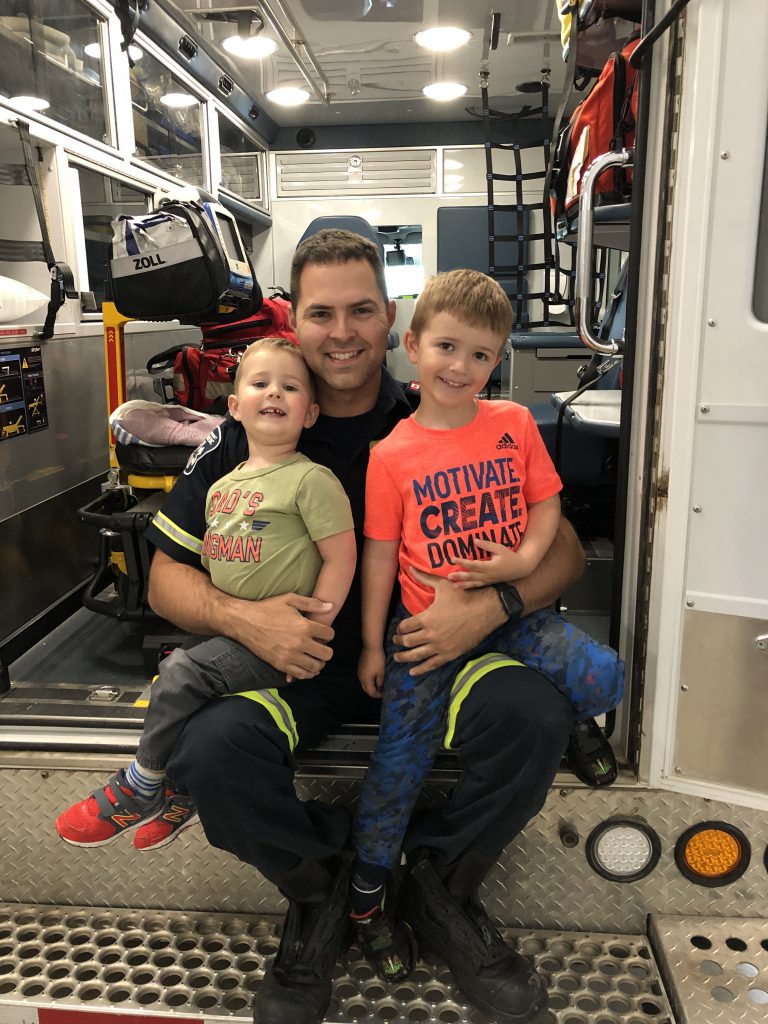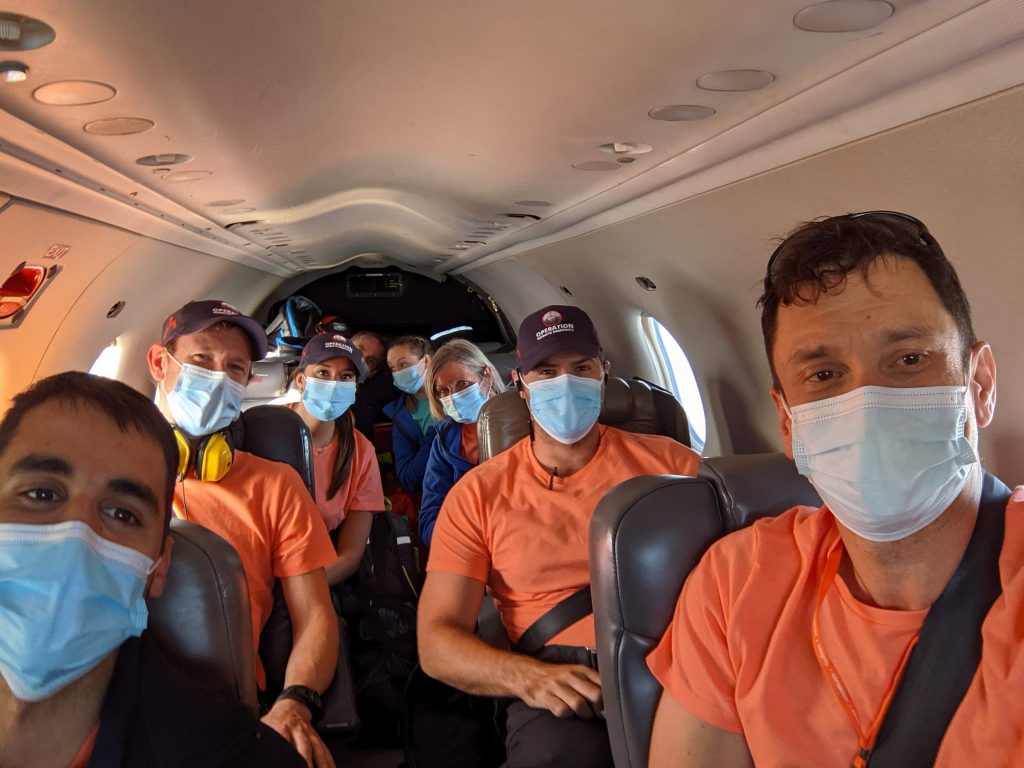Indigenous Paramedic student reflects on ‘one of a kind’ experience administering COVID-19 vaccinations
Sept. 7, 2021

When Ornge invited students in Georgian’s Advanced Care Paramedic (ACP) program for a second time to help administer COVID-19 vaccinations in remote, fly-in Indigenous communities, Dustyn Paton knew he had to participate.
“I have Indigenous (Mohawk) heritage; I grew up on the Six Nations of the Grand River reserve; I was born and raised there; and I currently work there as a paramedic,” he says.
“Six Nations was the reason I was able to go to college and get to where I am in life right now. So, when I had an opportunity to give back to some Indigenous communities, I was so excited about it.”
Dustyn, along with fellow ACP student Evan Daemke, volunteered to join Operation Remote Immunity, a COVID-19 vaccination program developed between Nishnawbe Aski Nation and Ornge, the province’s provider of air ambulance and critical care transport services.
Dustyn and Evan, who administered vaccines, are already primary care paramedics.
Jon Lee, a part-time instructor in Georgian’s paramedic programs and an Ornge critical care paramedic, was also on their team.
Second experience with Operation Remote Immunity
A team from Georgian had previously participated in Operation Remote Immunity in March to help administer second doses of the Moderna vaccine in Eabametoong First Nation.
This time, between June 26 and July 3, they travelled to three communities – Eabametoong, Kashechewan First Nation, and Kitchenuhmaykoosib Inninuwug First Nation – to administer first doses of the Pfizer vaccine to kids aged 12 to 18.
We talked to Dustyn about his experiences as part of Operation Remote Immunity.

How was the Operation Remote Immunity trip?
The trip was amazing. We vaccinated hundreds of people 12 years old and up.
It was pretty unique working with so many different agencies, too. We worked alongside public health, nursing agencies and Ornge. To work on such a large-scale operation and see how smooth everything went was pretty cool.
I’ve been a paramedic for 13 years and this trip was completely unique from anything I’ve ever done before. It’s one of a kind.
As soon as I heard about the initiative, I knew I had to be a part of it.
Why were you so motivated to be part of Operation Remote Immunity?
When I first decided I wanted to go to college, I reached out for help from my high school guidance counsellors and the education department in my community of Six Nations.
No one else in my family had gone to college at that time, so Six Nations was the reason I was able to go to college and get to where I am in life right now.
Being Indigenous and being able to go north to help protect communities means a lot to me.
What was it like being part of Operation Remote Immunity as someone with Indigenous heritage?
It made the experience more personal for me.
Six Nations, where I grew up, is a pretty large reserve, so it’s not as rural and it’s fairly central to larger towns and cities like Brantford and Hamilton.
I had never been to any reserve outside of Six Nations before, and I certainly hadn’t visited any remote communities like the ones supported by Operation Remote Immunity.
It was really interesting for me because even though these communities are very remote and face a lot of adversity, there was a similar theme between them and my home reserve: the importance of community.
Their primary concern is the protection of the community and protecting the elders. That’s pretty consistent even at Six Nations. For me, that was pretty refreshing to see.
Being Indigenous and being able to go north to help protect communities means a lot to me.
Dustyn Paton, Georgian Advanced Care Paramedic student
While we were there, I also got an opportunity to talk to a lady who was a residential school Survivor, which was a little bit more personal for me because my grandparents were part of the residential school system.
Like the stories you hear about in the news, my grandparents were pulled from their homes as children.
That system led to a lot of generational trauma and long-term trust issues among our communities.
With the recent discoveries at the former residential schools across Canada coinciding with our time in community, the vaccination team had a heightened awareness of how our presence could be perceived.
Being Indigenous myself, it was perhaps easier for me to foster more trust with the communities we visited.



What was it like participating in Operation Remote Immunity?
The communities were very, very welcoming. They knew why we were there and the importance of the vaccine.
A team of us flew from Toronto to Thunder Bay on the Saturday. We had orientation and training on Sunday.
Then from Monday to Friday, we flew out from Thunder Bay into the remote Indigenous communities first thing in the morning and flew back each night.
We flew in a small plane with all of our vaccination equipment, along with survival gear in case we had to remain overnight due to weather.
We went to Eabametoong, Kashechewan, and Kitchenuhmaykoosib Inninuwug First Nations.
Sharing his story with Indigenous communities
I also got to participate in a radio interview in Eabametoong on one of the local shows. They asked me a little bit about my upbringing, what it’s like being a paramedic, and how to go about becoming one if you are a First Nations individual.
From the feedback we got, as a result of my interview, some people who were vaccine hesitant decided to go ahead and get vaccinated.

Arguably, Indigenous populations are one of the most vulnerable populations we have in North America, so providing vaccines to people who are at high risk of developing complications is an extremely important initiative.
Being part of the team going in and getting the vaccine into people’s arms has a direct impact on lives and is a major factor in preventing serious illness and outbreaks from COVID-19.
What would you tell someone who is hesitant about getting a COVID-19 vaccination?
Everyone’s allowed to make a decision on something that directly impacts themselves.
In my opinion, if the hesitation is because they don’t think it’s effective or they don’t need it because they’re healthy enough to survive COVID-19, they should consider getting the vaccine to help protect the person beside them.
That’s the key to the vaccination campaign. Yes, it’ll protect you, but it’ll also help stop the transmission from the healthy population into the unhealthy population, and from the non-at-risk population into the significantly at-risk population.
If you’re young and healthy and you want to protect the at-risk populations, the way to do that is to vaccinate yourself.
Dustyn Paton, Georgian Advanced Care Paramedic student
If you’re young and healthy and you want to protect the at-risk populations, the way to do that is to vaccinate yourself.
I’m a young, healthy, 33-year-old guy. If I got COVID-19, more than likely I would be fine, but if I got COVID-19 and I gave it to my mother in law or my mother or my father, there’s a risk that they could suffer serious complications or die.
I would ask a hesitant person who doesn’t want to get vaccinated to think about the affect it has on other people versus just themselves.
What did you learn from your experience with Operation Remote Immunity?
I took away the importance of community and looking out for one another, as well as how to work in a largescale operation in a multi-team approach. Doing that effectively was a good learning opportunity.
I also learned just how adverse the conditions are for some rural communities in northern Ontario.
From my perspective, it’s got to be difficult to live in such a rural, remote community, with either ice roads in or fly-in only.
Some of the communities run off generator back-up power. If the generator supply goes down, the water supply goes down.
One of the things that struck home for me was when we had a case of water left over at the end of the day, and we were asked to leave it behind.
They had potable water, but if the generator goes down they have to rely on $78 cases of water to survive.
Dustyn Paton, Georgian Advanced Care Paramedic student
I thought, “Why would they want us to leave bottled water?” It turns out a case of water like that is $78 to be flown into the community. They had potable water, but if the generator goes down they have to rely on $78 cases of water to survive.
Visiting rural communities, experiencing the culture, witnessing firsthand the adversity they face – it gives me a better appreciation for the kinds of things that might actually help these communities to become safe and prosperous.

Why did you become a paramedic?
It kind of happened by fluke.
I grew up on Six Nations in a very low-income household, and I never really had any dreams or aspirations to go to college or do anything to better myself.
I always thought I’d like to be a doctor, but nobody in my family had gone to college or university or had a job outside of physical labour.
So, to me, I thought it would be cool to be a doctor but I didn’t have the means to do it.
I wanted to take the easy way out. I just thought, “I’ll work in a factory, I’ll work at a gas station.”
But when I was in high school, I met a girl and her mom was a teacher.
I’m extremely grateful for the shove in the right direction. It changed the course of my life.
Dustyn Paton, Georgian Advanced Care Paramedic student
This girl and I had been dating for six or eight months when her mom asked me what I wanted to do after high school.
I said, “Oh, I’ll just work as a gas driller or something like that.” She said, “If you’re going to date my daughter you’re going to do something more with your life than working on a gas drilling rig.”
At the time, I thought this girl was my “forever girl,” so I thought, “OK, I guess I’m going to college!”
Connecting with services to find a way to college
I connected with Six Nation’s education department and my high school’s guidance counsellor.
I filled out a job aptitude test, and doctor, nurse and paramedic came up, so I signed up for a couple co-op courses with the local paramedics and a physiotherapy clinic. Back then, they would allow high school co-op students to ride with paramedics on the ambulance.
The physiotherapy co-op didn’t work out because I didn’t like being stuck indoors all day. I liked being out and about and doing things that were exciting.
For the paramedic co-op, we responded to a car accident on my first shift, and I was hooked.
‘I never have a day where I regret my decision’
I found Georgian College and did the Pre-health program first, then the Primary Care Paramedic program. Here I am back doing the Advanced Care Paramedic program at Georgian.
I’ve enjoyed every minute of being a paramedic, and I go to work with a smile on my face every day.
I just love the job and never have a day where I regret my decision.
The girlfriend, whose mother pushed me toward postsecondary, didn’t last though.
But I’m extremely grateful for the shove in the right direction. It changed the course of my life.